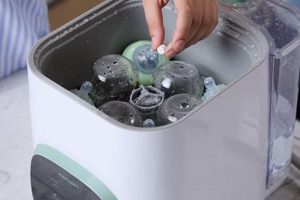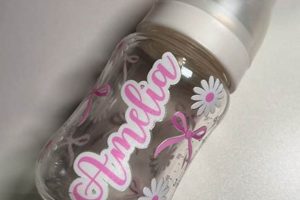
An improvised smoking device crafted from a feeding bottle designed for infants. Its components often include the bottle itself, acting as a water chamber, and a makeshift bowl and downstem fashioned from... Read more »

Audible clicking sounds emanating from an infant during bottle consumption often stem from challenges coordinating suction, swallowing, and breathing. Air may be inadvertently introduced into the oral cavity, resulting in the characteristic... Read more »

Infant somnolence during feeding, specifically with a bottle, refers to the tendency of a young child to drift off to sleep while being fed. This behavior can manifest as a gradual slowing... Read more »

Automated bottle cleaning and sanitizing systems represent a technological advancement in infant care. These devices automate the labor-intensive processes of washing, sterilizing, and drying baby bottles and related accessories, offering a convenient... Read more »

An automated device designed for the hygienic cleaning and sterilization of infant feeding bottles and related accessories. These machines typically employ a combination of pressurized water, detergent, and heat to remove milk... Read more »

Containers specifically designed for transporting infant feeding implements, alongside related necessities for childcare, represent a category of products aimed at facilitating parental convenience. These specialized carriers often incorporate insulated compartments to maintain... Read more »

A personalized feeding container for infants allows for specific design choices related to the container’s appearance, markings, or accessories. For example, a parent might select a container adorned with the child’s name... Read more »

The concept refers to a scaled-up feeding device intended for use within a fictional scenario involving individuals of immense size. This item, significantly larger than conventional feeding implements, is posited as a... Read more »

Infant movement during feeding sessions, specifically when utilizing a bottle, manifests as restlessness or agitation. This behavior can present as a range of actions, from subtle shifts in posture to more pronounced... Read more »



